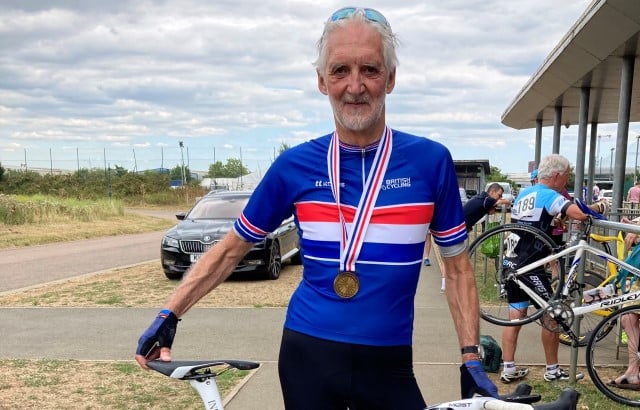

Brian Cookson OBE was one of 106 men who took part in a study we funded investigating the impact of heart scarring on veteran male athletes.

The 74-year-old grandad from Whalley, Lancashire has dedicated his life to cycling, both as a competitor and as President of British Cycling and Union Cycliste Internationale – cycling’s world governing body.
Brian got involved in the study after seeing a post on a Masters cycling Facebook group. “Being involved in competitive cycling, I’ve always had an awareness of heart health. When I saw the post I thought ‘that's interesting, I'll give that a go’. I’ve never had any problems with my heart before, but I thought if there is anything wrong, they'll spot it.”
Competing regularly
Since retiring, Brian had been training and competing more regularly. He says, “I was competing quite a bit and probably training harder than normal. One day, while training at Manchester Velodrome I had unusual episode. I was cycling and started feeling strange. I didn’t know if I was in a dream, if I was asleep – then I hit the floor.” Brian had fainted on the track.
“I didn’t think it was to do with my heart, because I’d never had any issues before. I’d also been diagnosed as pre-diabetic, so I just put it down to that. I changed my diet to try to manage my pre-diabetes and didn’t have a repeat of that problem again for a while.”
Then in May 2024, Brian was training at Manchester Velodrome when he started feeling unwell.
“I was pushing it a little bit on the track, but not absolutely full gas, as we say in cycling,” Brian says. “I came off and looked at my sports watch which read ‘new heart rate record – 238bpm’ and I thought ‘oh, that’s not good’. And it wasn’t going down.”
It took around 15 minutes for Brian’s heart rate to return to normal. Soon afterwards, he contacted the team leading the study about what had happened.
Recording every heartbeat
As part of the trial, Brian had been fitted with an implantable loop recorder, a small device about half the size of a biro pen placed under the skin of his chest to record his heart rhythm. That meant that every heartbeat he had – including at the velodrome – was recorded, so the researchers were able to see exactly what had happened for themselves.
“The next day, I got a call. They said, ‘Stop riding your bike, don’t do anything more strenuous than walking until we can get you in here because we think you need an ICD [implantable cardioverter defibrillator].’”
Brian had had an episode of ventricular tachycardia – an abnormally fast heartbeat where the heart’s main pumping chambers, the ventricles, contract too quickly and don’t pump blood around the body effectively. Ventricular tachycardia can lead to cardiac arrest.
Older male endurance athletes, who have spent years training and competing, could be at higher risk of developing scarring in their hearts, which is linked to an increased risk of dangerous abnormal heart rhythms, according to research we funded.
Find out more about the studyIn August 2024, he was fitted with an ICD - a small device which will shock the heart if it goes into an abnormal rhythm.
Brian is cycling again but has agreed with his doctors that he won’t push himself as hard. “I keep a closer eye on my heart rate now and if I’m getting to 150bpm I’ll start backing off,” he says. “We’ve all agreed that I can’t be breathing through my ears anymore, as we’d say in cycling.
“I’m so grateful to have been part of this study. It might well have saved my life,” Brian reflects. “Without it, I might have carried on pushing myself until something more serious happened.
"I wouldn't do anything differently"
“I don’t think people should be put off by this – if I could go back to when I first got into cycling, I wouldn’t do anything differently. I still have all the health benefits that a lifetime of staying active brings. Heart problems can affect anyone so I would say to others like me, don’t take your health for granted. If you get the opportunity for a health check, take it and if you have any symptoms, rest and get them checked out.
“Everyone can benefit from exercise, and taking part in competitive sport is fun. We’ve been able to take action to manage my condition, and I’m still cycling regularly. The way I put it is, maybe it's time I started acting just a little bit more like I'm 70-something, rather than like I'm 20-something. Maybe I’ll compromise and act like I’m 50-something! One thing’s for sure – I won’t be stopping cycling any time soon!”


